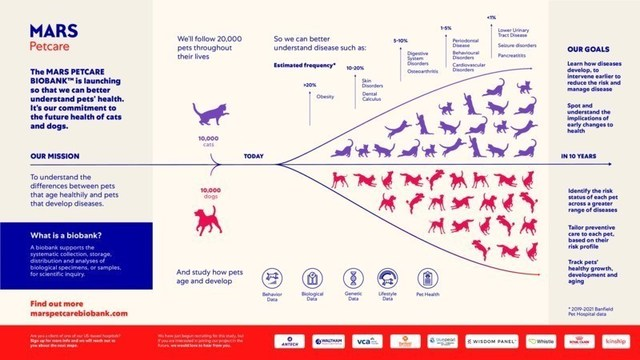
Mars Petcare Biobank
Mars Launches World's First Pet Biobank
Mars Petcare has announced an unprecedented scientific initiative designed to improve understanding of pet health and disease, and help scientists and veterinarians innovate individualised healthcare for pets.
The Mars Petcare Biobank aims to be the largest, most comprehensive real-world study of its kind, recruiting 10,000 dogs and 10,000 cats across the United States over 10 years. The biobank study will generate longitudinal physiological data from the samples collected and connected to other metadata to gain insights about changes in health status and understand the differences between pets that are healthy as they age and pets that develop diseases. By enrolling their pets in the study, pet owners will help enable new scientific discoveries to improve pet health for generations to come.
"We aim for this biobank to drive breakthroughs in scientific knowledge for the future of pet health," said Poul Weihrauch, president, Mars Petcare. "Pets make our world better, so it makes sense that we are investing in state-of-the-art research in service of our purpose to make a better world for pets."
The biobank is part of a long-standing commitment to investing in innovation, science, and technology. The company has a well-established history in driving transformative pet health innovation through the Waltham Petcare Science Institute, which has focused on pet health for over 50 years; and through Mars Veterinary Health, a network of 2,500 veterinary clinics and diagnostic labs across more than 20 countries.
Key goals: Early diagnosis and preventive health
"As a veterinary organisation that touches the lives of more pets in more places than any other veterinary healthcare provider, we believe this biobank will help transform pet care for future generations of dogs and cats by engaging clients in their pets' care in a new way and enabling veterinary teams to detect potential health issues before they happen," said Jennifer Welser, DVM, DACVO, Chief Medical Officer, Mars Veterinary Health.
"The insights gleaned from this study have the potential to improve preventive pet care and individualised interventions, enabling even more pets to stay healthy."
Today, pets are generally diagnosed and treated when disease is already present. The Mars Petcare Biobank data aims to help scientists identify associations of early disease detection.
Scaling scientific insights into pet health
With scientists currently being unable to closely follow the health status of very large numbers of pets throughout their lives in a standardised way, it is challenging to spot patterns and early changes that may precede disease. Looking ahead, as part of the biobank analysis, scientists will study biological samples, pet health trends, genetic and behaviour data over the next 10 years to identify early signs of potential disease and uncover new ways to support healthy development and aging, disease prediction and prevention, individualised nutrition, and health monitoring.
What sets the Mars Petcare Biobank apart from other pet biobanks is not only its scale – 20,000 dogs and cats – but also that it is open to all breed makeups and lifestyles. Existing pet biobanks often study certain species, breeds or diseases.
Dogs lead the way
The study is now recruiting healthy dogs (older than six months and younger than 10 years old) already visiting select VCA Animal Hospitals and Banfield Pet Hospital locations in the USA. The study will begin recruiting cats later this year.
Veterinary teams at participating Banfield and VCA hospitals will see pets for annual health checks and collect samples, such as fecal and blood. Once collected, samples will be analysed by technicians at Antech Diagnostics and stored for future analysis by scientists at the Waltham Petcare Science Institute.
For more information about the Mars Petcare Biobank visit marspetcarebiobank.com.
More from Linnaeus Group
- Mars Veterinary Health publishes 2025 Science Impact Report highlighting global advances in pet health
- AMVS specialist gets to heart of puppy's problem
- Garston Veterinary Group team earn BVRA recognition
- Chihuahua Lola loving life after 'challenging' spinal surgery
- Vets save therapy cat's life following road accident

 4 years ago
4 years ago  1539 views
1539 views
